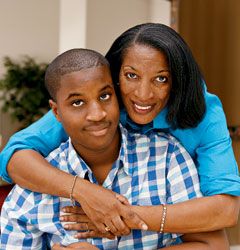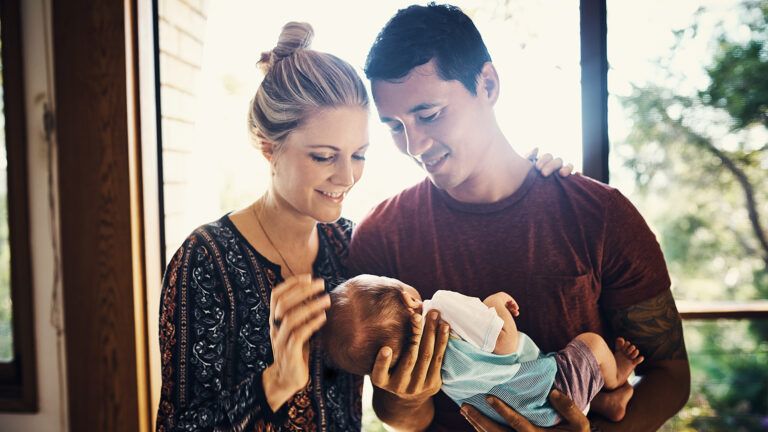My son, King—short for Kingston—sprang the question on me one January morning. We were sitting in the breakfast nook looking at his favorite book, a collection of pictures of Dr. Martin Luther King, Jr. Actually, it was more of an announcement than a question.
“King want to talk about Martin Luther King,” he said. “King want to give speech.”
My stomach lurched. I knew what he was referring to. That Sunday our church would be celebrating Dr. King’s birthday, and my son wanted to speak in front of the entire congregation as part of the program.
Most parents would have been thrilled. I was terrified of what might happen to King, alone and vulnerable standing up there at the podium.
A decade before, King had been diagnosed with autism. It was a neurological disorder, the specialists told my husband, Dave, and me. And a lifelong condition.
They said we needed to prepare ourselves to raise a child who would live in a world of his own and would have difficulty showing affection, making friends and simply communicating.
Well, at 13, King could communicate—at least enough to ask to do things that in my opinion were beyond his ability. Like singing in the church choir, which he’d been talking about since he was five. And for that long, I had been putting him off, finding creative ways to say no.
It wasn’t that I didn’t want him to have opportunities. But the reality was, there were things an autistic child would never be able to do like other kids. I didn’t want to set my son up for failure.
Now here he was, asking to give a speech.
What do I tell him? I thought. There’s no way he can do this.
“How about you talk about Dr. King just for me and Dad,” I said, trying to find the right words. “Right here at home. You’ll like that better.”
King set his jaw stubbornly. “King give speech,” he insisted.
Just then, Dave walked into the kitchen. “What’s wrong?” he asked, seeing King’s expression.
I told him.
“Hmm,” Dave said. “Actually, I think he’s ready to do something like this. We could write just a few lines for him to read. Come on, King, let’s talk about what you want to say.” The two of them went into the living room.
God, I asked, can’t you make them see this is a disaster waiting to happen? Haven’t I been asking you all these years to give King understanding, to help him know his limitations? To help me protect him? What was Dave thinking?
Back when King was diagnosed, it was Dave who panicked. He couldn’t come to terms with having a son he would never play football with, never send to college. Gradually, though, he and King bonded. They listened to gospel songs in the car and King belted out the choruses in perfect pitch.
“I think God has King in hand,” Dave said to me.
I wanted to believe that too—wanted to believe it so much. But we live in a world that’s not always kind to people with disabilities. King didn’t need any pie in the sky about being just like other kids. Anyone could see he was different.
What my son needed was protection from people who made fun of him, who didn’t understand his unpredictable, sometimes bizarre, behavior, his rudimentary speech. That meant no trips to the park. No playing with neighborhood kids.
I was even reluctant to take King to church. Dave had to talk me into it. Most Sundays, I got so distracted trying to keep King under control, I barely heard the sermon.
Once, the pastor called all the children up to the altar. King squirmed to join them, and I had to grab him by the waist to keep him in his seat. The kids, bright and tidy in their pressed shirts and pastel dresses, scampered up onstage.
The pastor told a story about saving for a rainy day, then asked, “Now children, if you had some money, what would you want to do with it?”
Before anyone else could respond, King shouted out, “Go to McDonald’s!”
The congregation burst into laughter and I felt my face grow hot. I looked at King and had to restrain myself from covering his mouth.
Another time, King was startled by a crying infant. He wriggled out of my grip, darted between people’s legs and began grabbing at the baby, who was lying in a stroller. Panicked hands reached out to stop him. I picked King up and hustled him out of the sanctuary, people’s stares boring holes into my back.
That evening, after King was in bed, I turned on Dave. “You see? I told you church would be too much for him!”
“Honey, I know King can’t control himself sometimes, but he just needs some encouragement,” Dave said. “Maybe if we let him sing in the choir with other kids, they’ll watch out for him. And he’ll get the hang of it eventually.”
“Watch out for him?” I almost shouted. “You can’t trust them to do that! You know how kids can be. They’ll tease him.”
I wasn’t going to subject my son to ridicule. It was bad enough overhearing the muttering when he acted out: “She can’t control him.… Let me have him for a day.… Some people ought to know when it’s better to stay home.”
And now this crazy idea that somehow King could keep it together to make a speech. In front of the whole congregation!
But Dave made it clear King was going to give that speech with or without me. So I wrote him a very brief one, a few lines about when Dr. Martin Luther King, Jr., was born and what made him special.
King was delighted with it. But all I could think as we went over the words was how each one was a chance for something to go wrong.
Saturday night, I lay in bed, staring at the ceiling and listening to Dave’s even breathing beside me. In my mind, nightmare visions scrolled—King stumbling on a word. King frustrated, having one of his outbursts while the congregation sat in awkward silence.
I closed my eyes. God, I prayed, please don’t make me go through with this. King will never recover.
I lay there, feeling more and more wretched. Then, from some corner of the room, or maybe it was from inside me, I heard a voice say: Ann, where are you placing your trust?
My eyes flew open.
Trust me, Ann.
I trembled. I wanted to say to God, What if my son has another one of his episodes? But I already knew the answer to my question.
I’m not keeping King out of church to protect him, I realized. I’m keeping him out of church to protect myself. Because I’m afraid to let him be who he is. Afraid of what people will think of him—and me. I need to let go, don’t I, God? Help me to do that. Help me to entrust my son to you. It was a hard prayer for me to say.
The next morning, we arrived as the sanctuary was filling up. The air burbled with hellos and choir members warming up. I escorted King to the altar, trying to ignore the curious looks from the congregation. I had to will myself to step aside and leave him alone at the podium.
King took a few moments to smooth out the paper with his speech. The sounds of throat-clearing and shuffling feet echoed throughout the sanctuary. Then King began reading.
I held my breath.
Slowly but surely, every word came out crisp and clear. Then he was done. He looked around calmly and, before I knew what was happening, had coaxed the entire congregation into saying the Lord’s Prayer with him.
“Amen,” King said.
“Amen,” everyone echoed.
Silence. Then a few claps. More clapping. And then the entire congregation was on its feet thundering out applause.
King beamed. I’d never seen him look so sure of himself.
Afterward, the choir director came up to me. “Ann,” she said, “we’d love to have King join the choir. I hear he has a splendid voice. Whenever you’re ready.”
“Thanks, but I don’t…” I started to say, then caught myself. She said, “Whenever you’re ready.” Not, “Whenever King’s ready.” Because he is. Okay, God, now I see. It wasn’t King who needed to be given understanding. It was me.
That didn’t mean that I wasn’t a nervous wreck that first time King sat with the choir a few weeks later. He looked so handsome up there in his red-and-white robe. But what would he do when the singing struck up around him? I needn’t have worried.
The children began the hymns, and he joined in as if he’d always been singing with them, his voice as pure and natural as when he’d sung those gospel songs in the car with Dave.
At the end of the service, King paraded up the aisle with the choir, his robe scuffing the floor. I thought he wouldn’t see Dave and me—his whole attention seemed focused on the recessional hymn. But just as he was about to pass, he scampered out of line and stood before us at the end of the pew. “King did good, Mom!” he cried.
I nodded and blew him a kiss.
Then he stepped back in line and I watched him take his place among the other children.
Watch King sing the National Anthem at an awards ceremony where he received the “Spirit of Life” Award.





